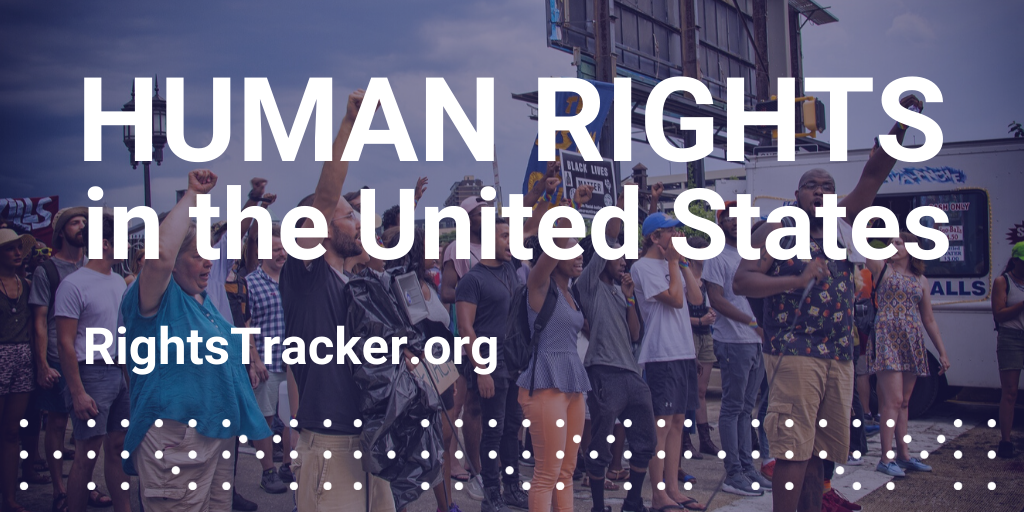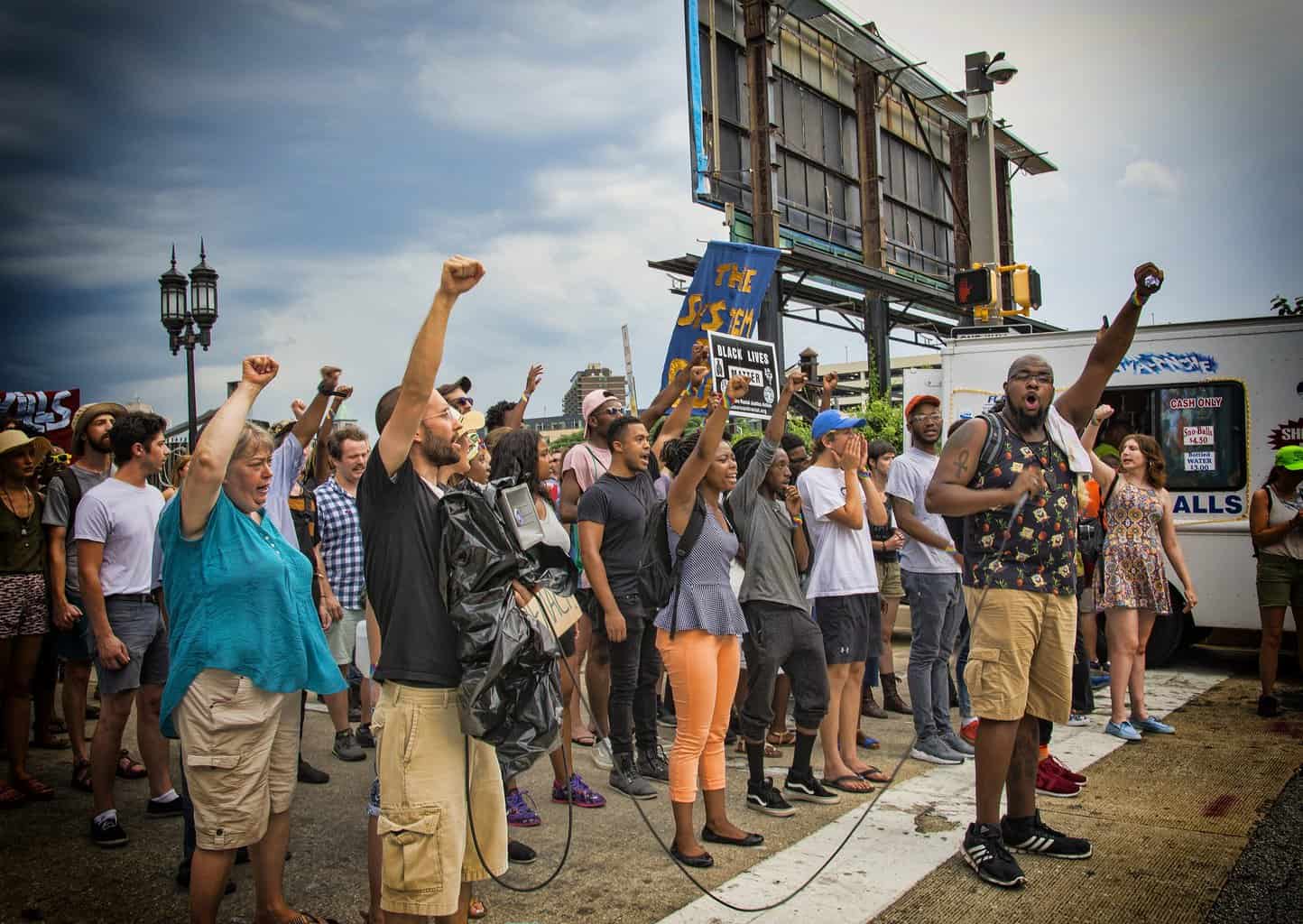The US scores poorly in HRMI’s latest human rights data
This country spotlight refers to data published in 2019. For the most recent data, go to our Rights Tracker.
On the last day of 2018, police in California shot and killed a teenager. This unnamed young man, armed with knife, but not fleeing from police, was the 992nd person to be added to the Washington Post Police Shootings database in 2018.
A new human rights data release from the Human Rights Measurement Initiative (HRMI) provides another perspective on the serious problem of police killings in the United States. In 2019 HRMI scores the United States performance on respecting the right to freedom from extrajudicial killing at a very low 3.9 out of 10.
Experts contributing to the development of the US scores identified police shootings, especially of African Americans and people of racial minorities, as a leading contributor to this poor score.
The word cloud below shows the percentages of expert respondents who identified each group as being particularly at risk of extrajudicial killing.
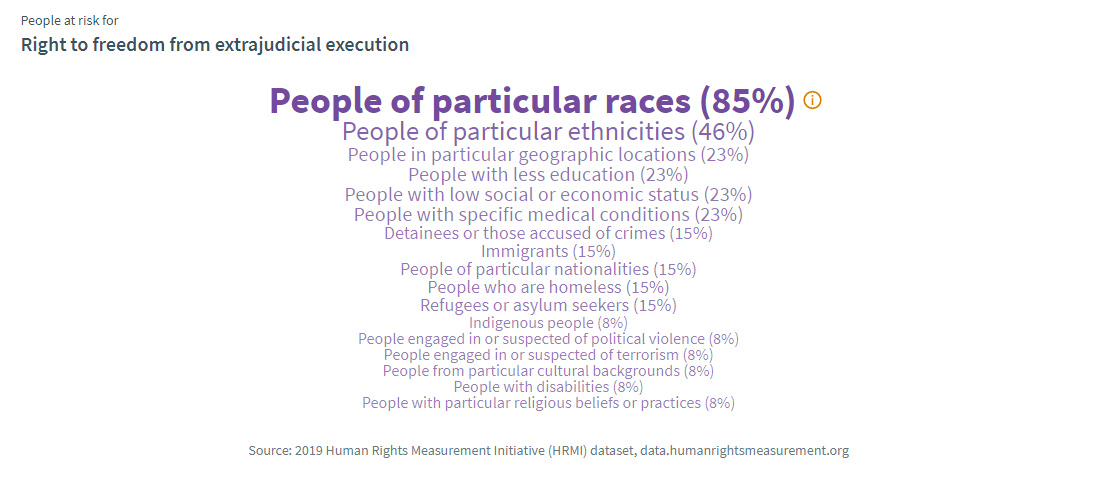
This is just one of the insights into the human rights landscape in the US that come from HRMI’s 2019 data release. Read on for more.
The United States scores poorly in 2019 HRMI human rights scores
HRMI’s human rights data on the United States include several strikingly poor results.
The 12 rights we measure are summarised by three category scores:
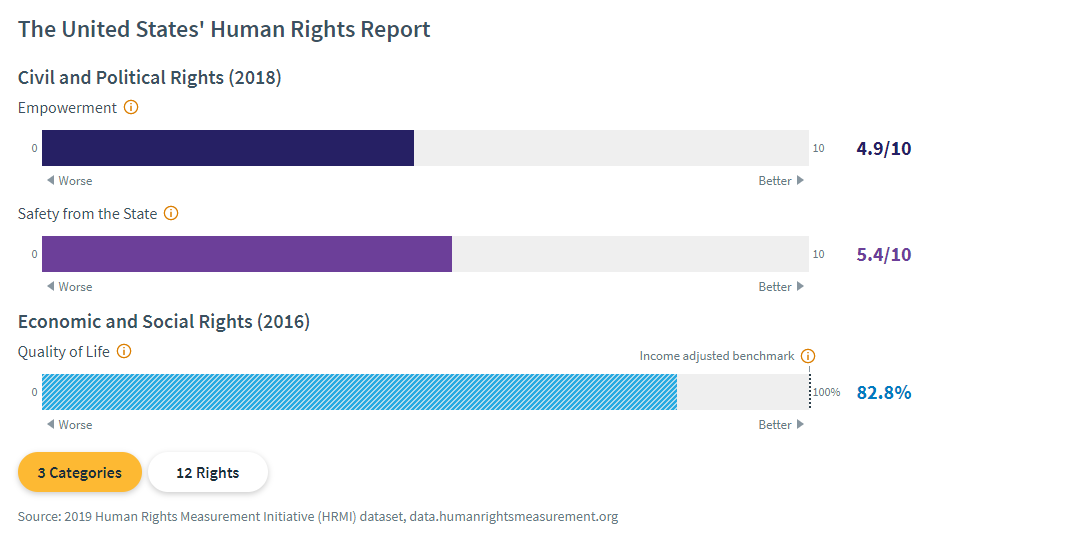
Empowerment: 4.9 out of 10
The United States scored 4.9 out of 10 for Empowerment rights, measuring:
- the right to participate in government
- the right to opinion and expression
- the right to assembly and association
The United States’ Empowerment score of 4.9, based on a detailed survey of human rights experts, suggests that many people are not enjoying their civil liberties and political freedoms.
Safety from the State: 5.4 out of 10
The United States scored 5.4 out of 10 for Safety from the State rights, measuring:
- freedom from torture
- freedom from execution
- freedom from disappearance
- freedom from arbitrary or political arrest and detention
The United States’ Safety from the State score of 5.4, based on a detailed survey of human rights experts, suggests that many people are not safe from arbitrary arrest, torture, disappearance, execution or extrajudicial killing.
HRMI co-founder, and Civil and Political Rights Lead, Dr K Chad Clay, calls the United States scores ‘very concerning, but sadly, not surprising.’ He says, ‘These results show that the United States’ human rights practices do not live up to its government’s rhetoric. Indeed, the United States’ performance on human rights falls well short of that observed in other high income democracies around the world.’
Quality of Life: 82.8%
The score of 82.8% for Quality of Life is a measure of how well the United States uses its wealth to ensure people’s rights to food, education, health, housing and work are met, taking into account its income. The score is produced by using data from international databases, and measuring outcomes against what other countries with a similar income level have been able to achieve.
Because the score takes income into account, every country should achieve 100%.
The United States’ score shows that it is only doing 82.8% of what should be possible right now with the resources it has. Since anything less than 100% indicates that a country is not meeting its current duty under international human rights law, HRMI’s assessment is that the United States has some way to goto meet its immediate economic and social rights duty.
HRMI co-founder, and economic and social rights lead Dr Susan Randolph says of the United States’ performance, ‘With regard to economic and social rights, on average across the five economic and social rights considered, the United States only achieves 82.8% of what evidence shows is feasible at its per capita income level. This places it in the bottom third of high income countries with full data on all five rights, just behind Luxembourg and just ahead of Hungary. The United States’ greatest deficiencies occur for the rights to work and education where it only achieves 66% and 76%, respectively, of what the best performing countries have at its per capita income level.’
What’s going on in the United States? Themes from the 2019 data
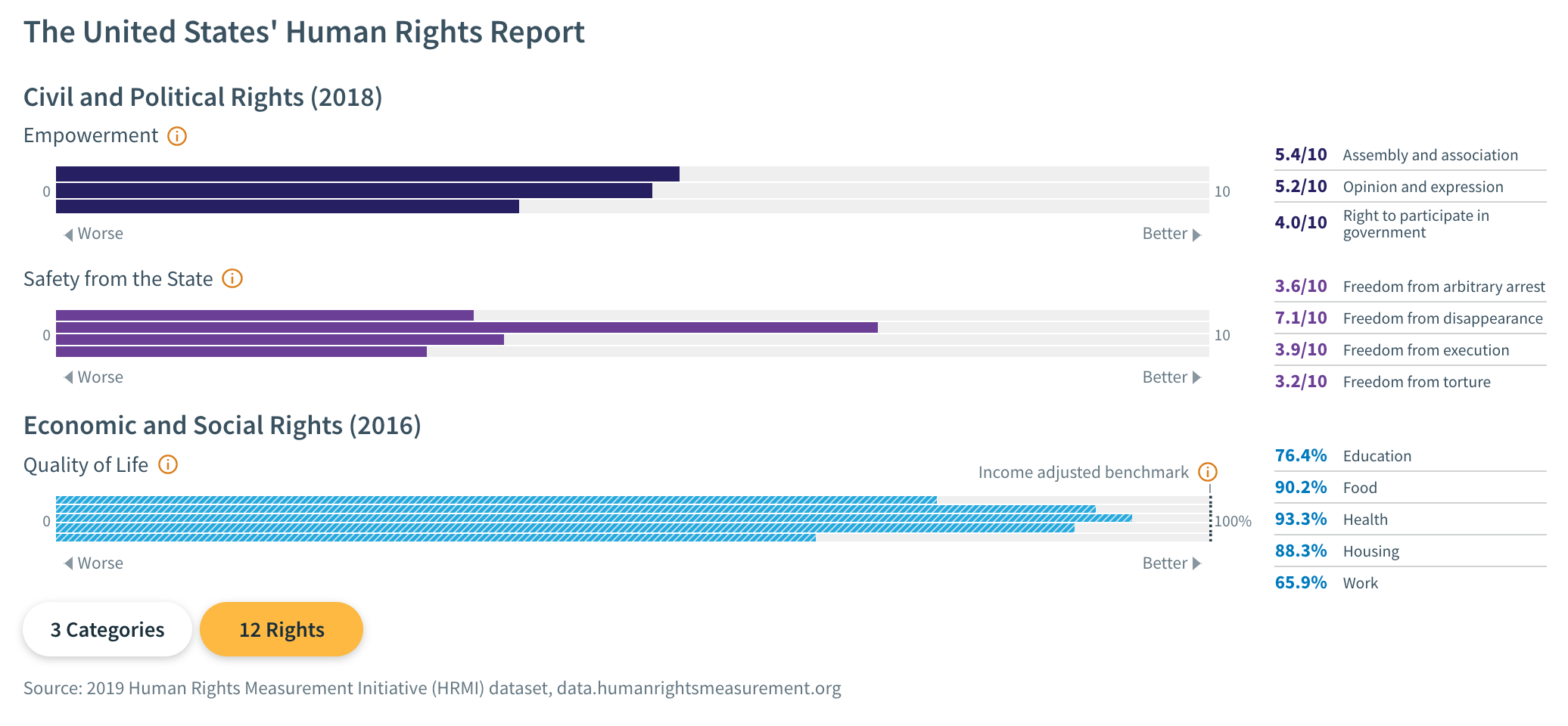
US scores very poorly for both executions and extrajudicial killing
The United States is one of only four countries in our 19 country sample to have executed people using the death penalty in 2018, and the only high income democracy in our sample to have done so.
The US also has a strikingly bad score for extrajudicial killing, 3.9 out of 10, particularly because of the lethal force used by police against African Americans and other people of colour. The chart below shows that the US score on this right is near the bottom of the sample, in company with Saudi Arabia and Mexico.
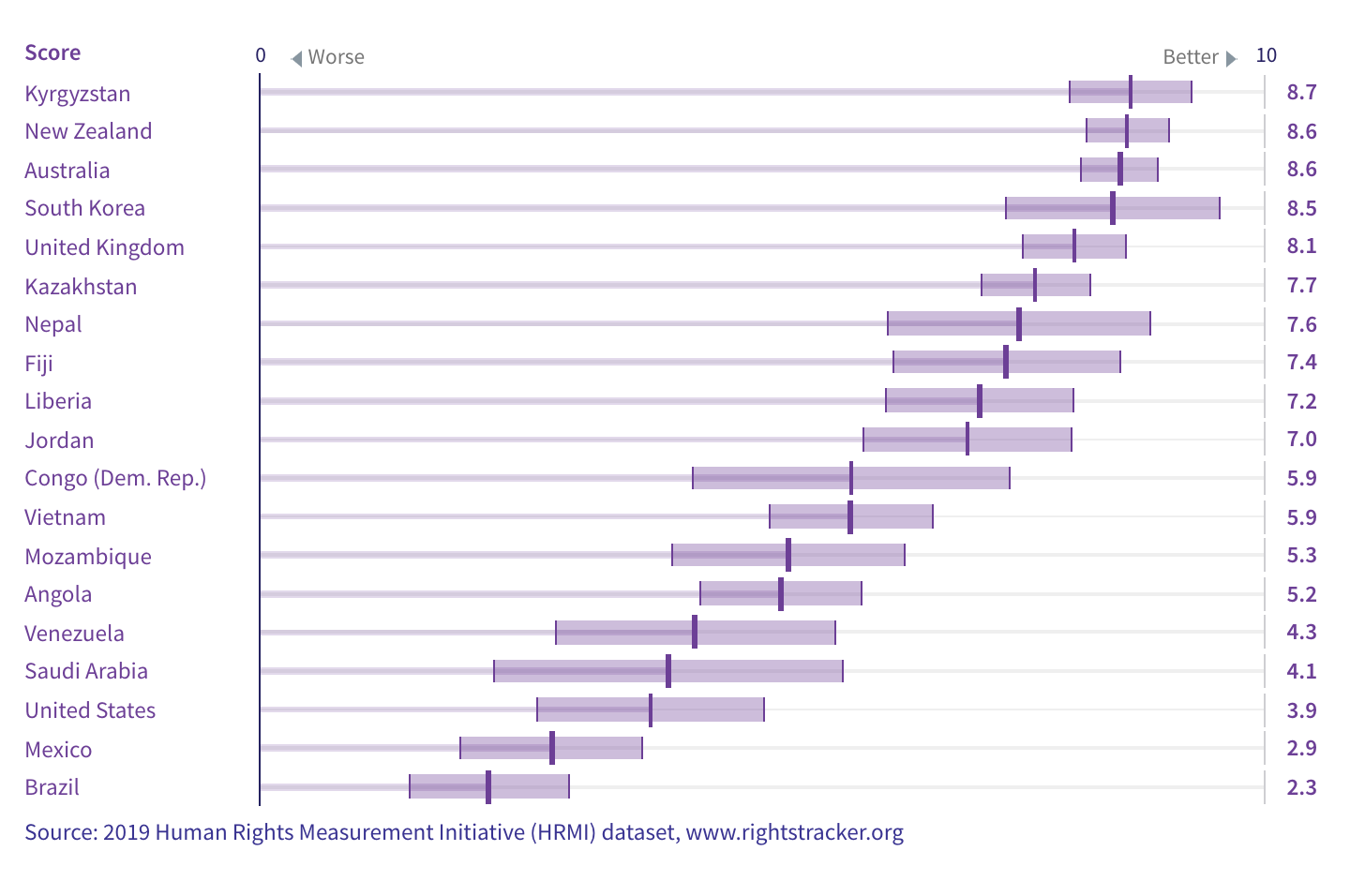
Voter suppression is widespread and affects people of colour the most
The United States’ score for the right to participate in government is just 4 out of 10.
Our expert respondents pointed to widespread voter suppression, especially affecting African Americans and other people of colour. Every single expert respondent listed race as a factor that made people vulnerable to abuse of this right, as indicated in the word cloud below. The numbers in parentheses show the percentage of expert respondents who identified each group of people as being particularly at risk of violations of this right.
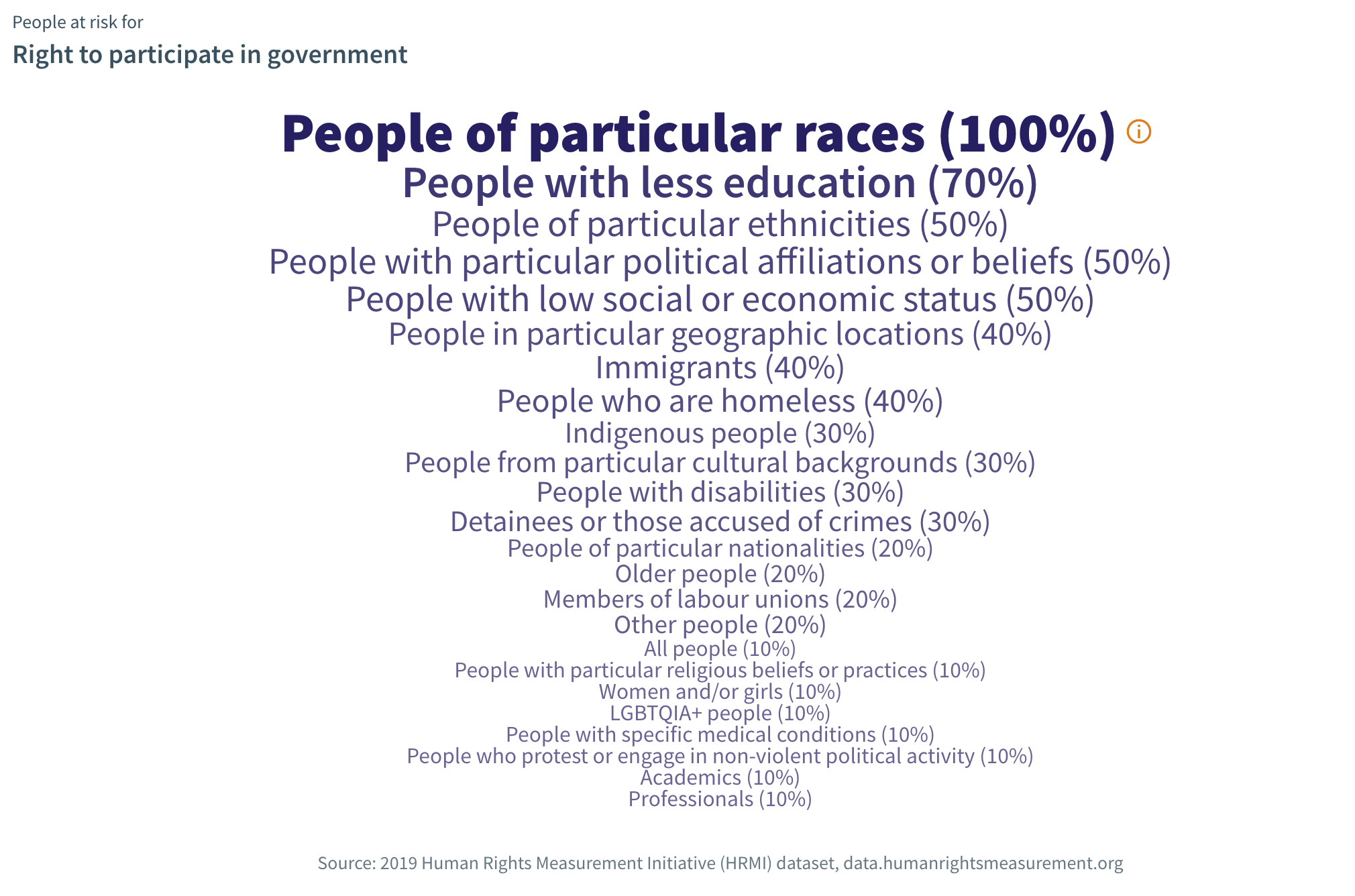
The US score on this right compares poorly to the 18 other countries in the 2019 data collection. The US score is around the same as Fiji and Mexico.
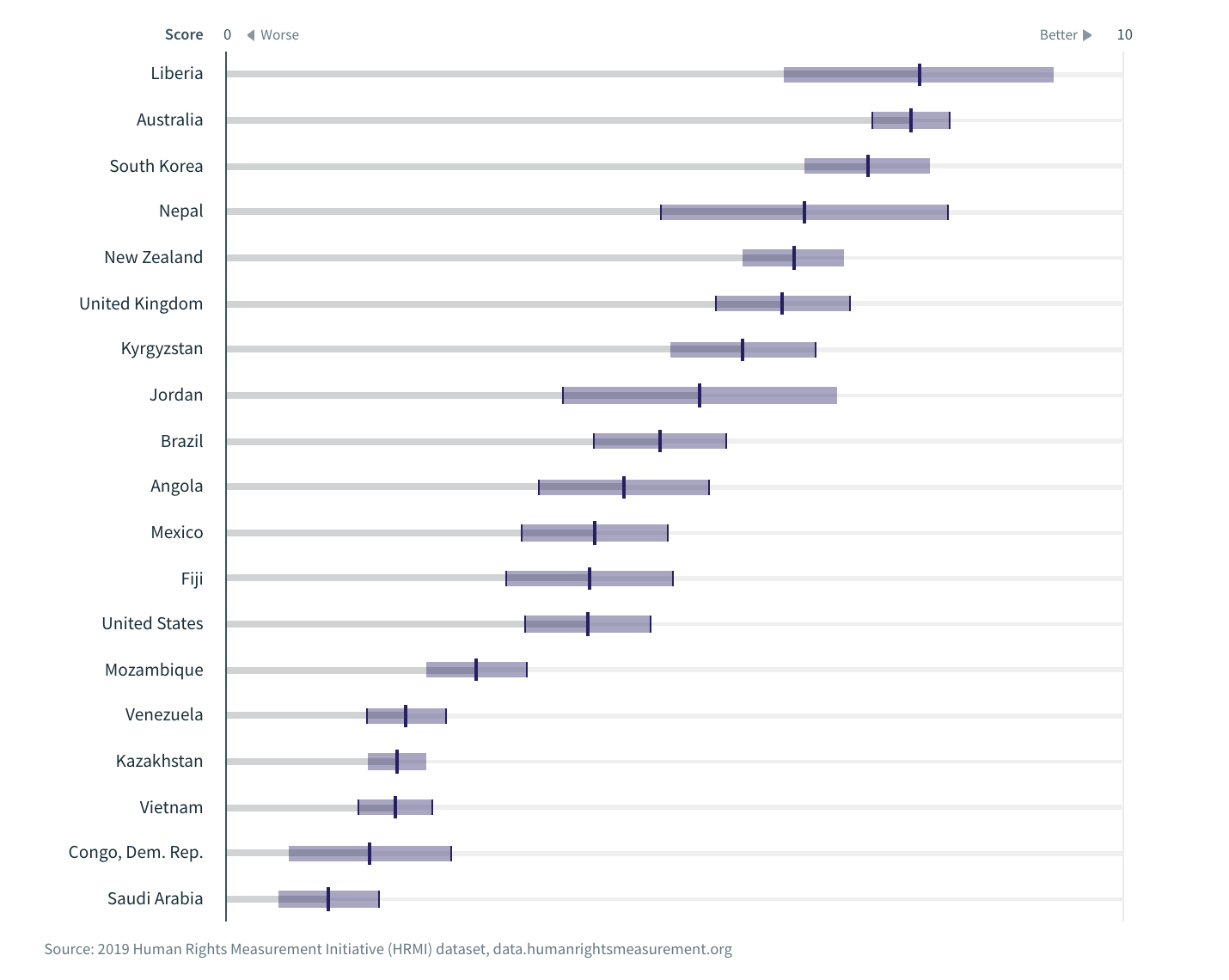
Native Americans suffer rights abuses
Having suffered the effects of colonisation and oppression for centuries, Native Americans are now in the position of suffering widespread human rights abuses. Native Americans were identified by experts we surveyed as being particularly vulnerable to abuses of nearly every one of the rights we measure.
US healthcare system fails to give effect to people’s right to health
The United States scored 93.3% for the right to health. This score measures performance and adjusts for income, so anything less than 100% indicates a country has a long way to go to meet even its most pressing minimum obligations under international law.
The word cloud below shows the percentage of our expert respondents who said these people were most at risk of not having their right to health realised.
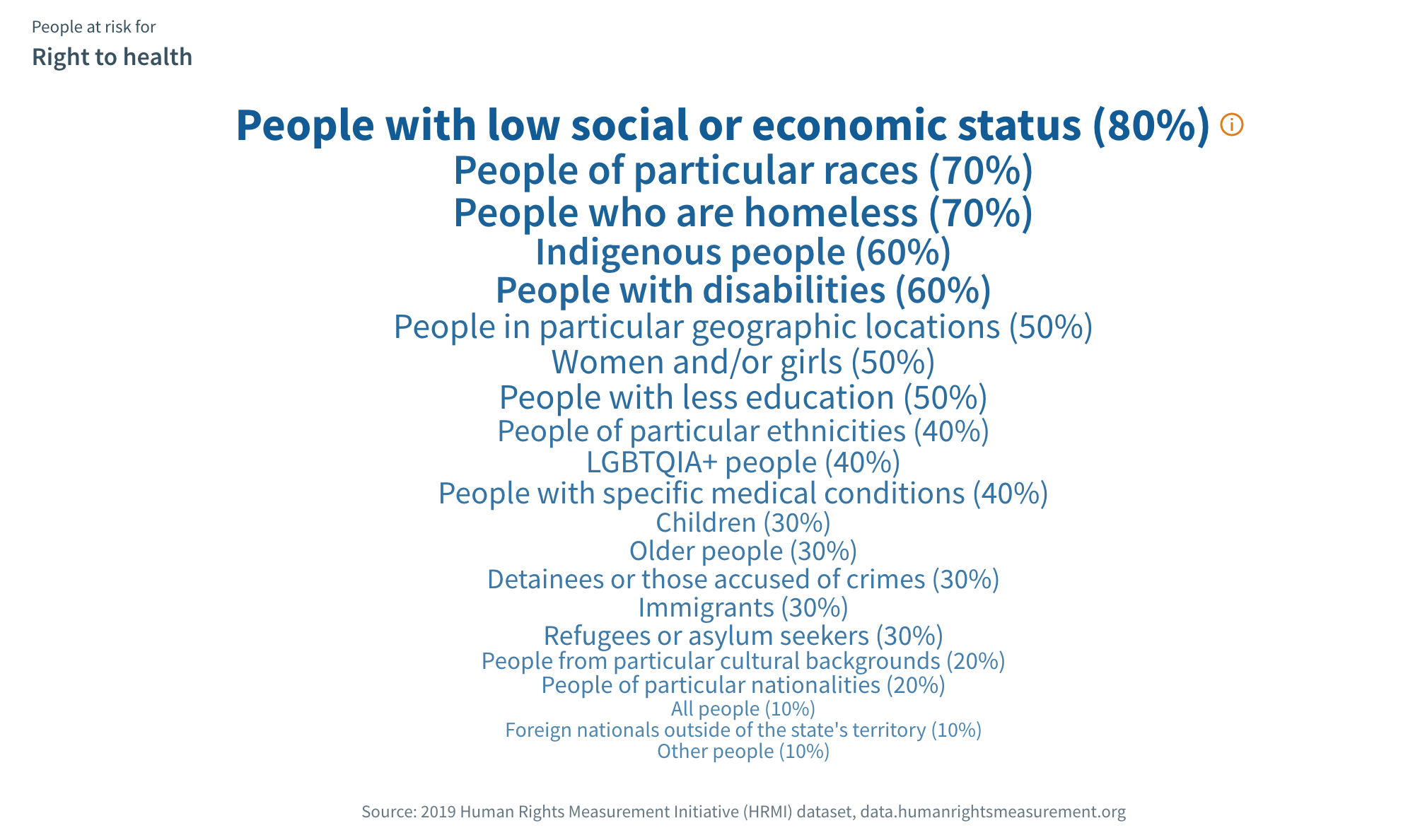
US is a difficult environment for unions
Forty percent of our expert respondents said that ‘all people’ were at risk of violations of their rights to unionise.
Further, the United States’ score for the right to work (which includes the right to social security) was in the bottom half of countries that received scores for this right, behind Russia, France and Hungary.
The US scores for Safety from the State are disturbingly poor
In the HRMI 2019 sample of 19 countries where our expert survey was carried out, the US score for Safety from the State (freedom from torture, arbitrary arrest, execution, and disappearance), 5.4, falls in the bottom third of the table.
As shown in the table below, the countries with the best results for Safety from the State are New Zealand, United Kingdom, and South Korea. By contrast, the countries clustered around the United States’ score are Vietnam, Angola, and Mozambique.
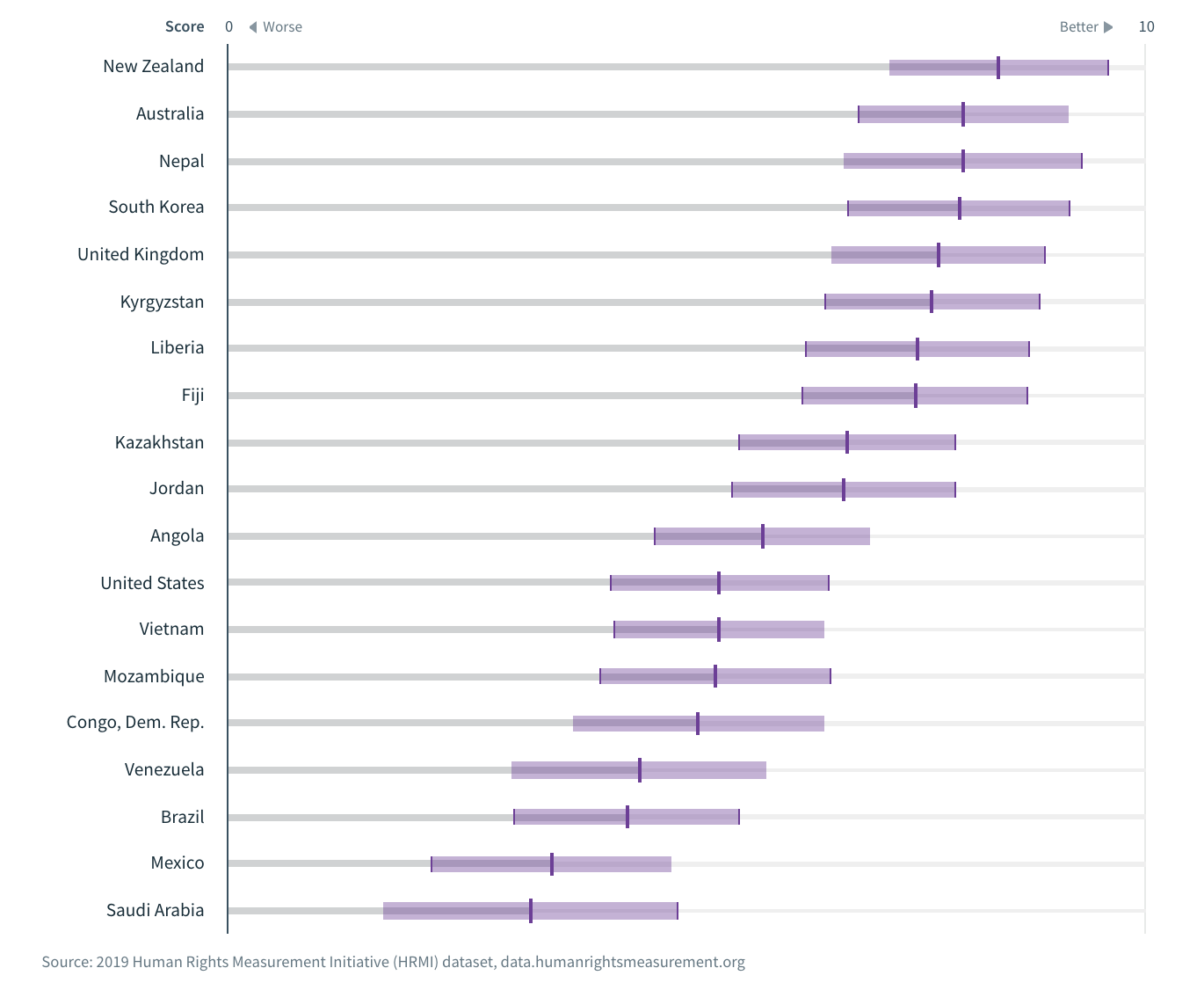
People most at risk of rights abuses
HRMI asked human rights experts which people were most at risk of having each right violated.
Here are some of the most striking findings:
African American people were identified by experts we surveyed as being particularly vulnerable to abuses of every one of the rights we measure.
African Americans were mentioned most often by experts as being at risk of violations of these rights:
- freedom from extrajudicial killing: particularly through the use of lethal force by law enforcement officers
- right to participate in government: particularly because of voter suppression efforts
- freedom from torture
- freedom from execution via the death penalty
- all Quality of Life rights (food, education, health, housing, and work)
Native Americans were identified by experts we surveyed as being particularly vulnerable to abuses of nearly every one of the rights we measure. Native Americans were mentioned most often by experts as being at risk of violations of these rights:
- right to participate in government: particularly because of voter suppression efforts
- freedom from torture
- right to assembly and association
- all Quality of Life rights, particularly health, housing and education
Latinx people were identified by experts we surveyed as being particularly vulnerable to abuses of most of the rights we measure. Latinx people were mentioned most often by experts as being at risk of violations of these rights:
- freedom from arbitrary arrest, especially at the southern border
- right to participate in government: particularly because of voter suppression efforts
- freedom from torture
- freedom from extrajudicial killing: particularly through the use of lethal force by law enforcement officers
- all Quality of Life rights, particularly health, housing, education, and just and favourable work conditions
Women and/or girls were identified by experts we surveyed as being particularly vulnerable to abuses of about half of the rights we measure.
Women and/or girls were mentioned most often by experts as being at risk of violations of these rights:
- right to just and favourable work conditions
- right to health
- freedom from torture
- right to a job
- right to opinion and expression
- all Quality of Life rights
LGBTQIA+ people were identified by experts we surveyed as being particularly vulnerable to abuses of about half of the rights we measure.
LGBTQIA+ people were mentioned most often by experts as being at risk of violations of these rights:
- right to just and favourable work conditions
- right to health
- freedom from torture
- right to a job
- right to housing
- all Quality of Life rights
Refugees and/or asylum seekers were identified by experts we surveyed as being particularly vulnerable to abuses of nearly every one of the rights we measure.
Refugees and/or asylum seekers were mentioned most often by experts as being at risk of violations of these rights:
- freedom from torture
- freedom from arbitrary arrest and detention
- freedom from disappearance
- freedom from extrajudicial killing: experts cited children detained by Immigration and Customs Enforcement
- all Quality of Life rights, especially housing, health, and education.
People with disabilities were identified by experts we surveyed as being particularly vulnerable to abuses of most of the rights we measure.
People with disabilities were mentioned most often by experts as being at risk of violations of these rights:
- right to just and favourable work conditions
- right to health
- freedom from torture
- right to participate in government
- right to a job
- right to housing
- all Quality of Life rights
The ‘people at risk’ data also highlighted the vulnerabilities of:
- homeless people
- people of lower socioeconomic status
- people with less education
- journalists
- human rights advocates
- immigrants
- prisoners
These are just some of the stories our data tell. Please explore the Rights Tracker yourself — by country, or by right — and let us know what you think.
Thanks for your interest in HRMI. You are also most welcome to follow us on Twitter, YouTube and Facebook, and sign up to receive occasional newsletters here.
